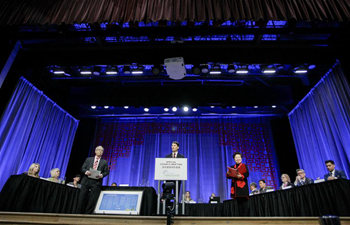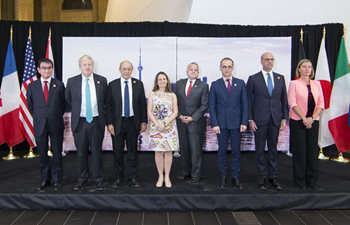by Julia Pierrepont III
SACRAMENTO, the United States, April 23 (Xinhua) -- The shelves at the office of the California Center, a business match-making and consulting service in Sacramento, are crammed with a colorful array of California's homegrown and manufactured products.
Central California is America's vast vegetable belt, contributing up to 95 percent of many of the country's most popular fruits and vegetables, and the shelves groan under packages of almonds, pistachios, garlic, broccoli, raisins, fruit juices and a lot more.
A platform connecting California's businesses to China, the center has seen brisk business since its establishment in 2014 but now, its leaders worry that its fortune may change, given the current situation in U.S.-China trade.
"It has everyone concerned...We're getting calls from our growers who have spent a long time building good relationships with Chinese importers...(They) are now wondering if there's even a future for their products in China in this uncertain political climate," Gordon Hinkle, vice president of the center, said.
Trade tensions between China and the United States have been escalating in recent months as Washington threatened to slap additional duties on Chinese goods worth 100 billion U.S. dollars, after proposing steep tariffs on Chinese imports worth 50 billion dollars.
Prior to that, Washington slapped hefty tariffs on steel and aluminum imports, citing national security reasons, which have hit several major U.S. trade partners, including China.
In response, China released a list of U.S. imports that could be targeted should Washington proceed with its trade offensive.
"We had a great year last year facilitating several big deals with China for our agribusiness clients, but this U.S.-China trade war has brought a lot of these deals to a standstill," Hinkle said, lamenting that the positive momentum seems to have been washed away by the uncertainties in bilateral trade.
"We had negotiated a big deal to export 50 percent of all U.S. sorghum to China but ... a tariff was slapped on it... So those shipments aren't happening now," Lei E., the center's program director, added.
The center has been fielding calls from other California growers and companies who are concerned about the future of their businesses.
Margaret Wong, founder of the consultancy and a prolific entrepreneur once called Sacramento's "Business Empress" by local daily the Sacramento Bee, said she felt the pinch of the recent trade frictions in her LED lighting business.
"We are very big in LED lighting, and our transformers are made with steel, so with a 25-percent tariff we're dead!" she exclaimed.
"We do encourage both sides to work through these issues because so many businesses in the U.S. and China rely on trade," Hinkle said.
While some California businesses are taking a wait-and-watch attitude, others are lobbying their congressmen since they can hardly afford losing the Chinese market, now the top export destination for many of California's signature products, including nuts, fruits and wine.
Susanne Sterling, vice president of international affairs at California's Chamber of Commerce, said her agency "is always concerned about raising tariffs because they result in higher costs, fewer consumer choices, and can lead to escalation that is not good for either side or the world economy."
"The key to resolving these issues is to keep talking," she said.













